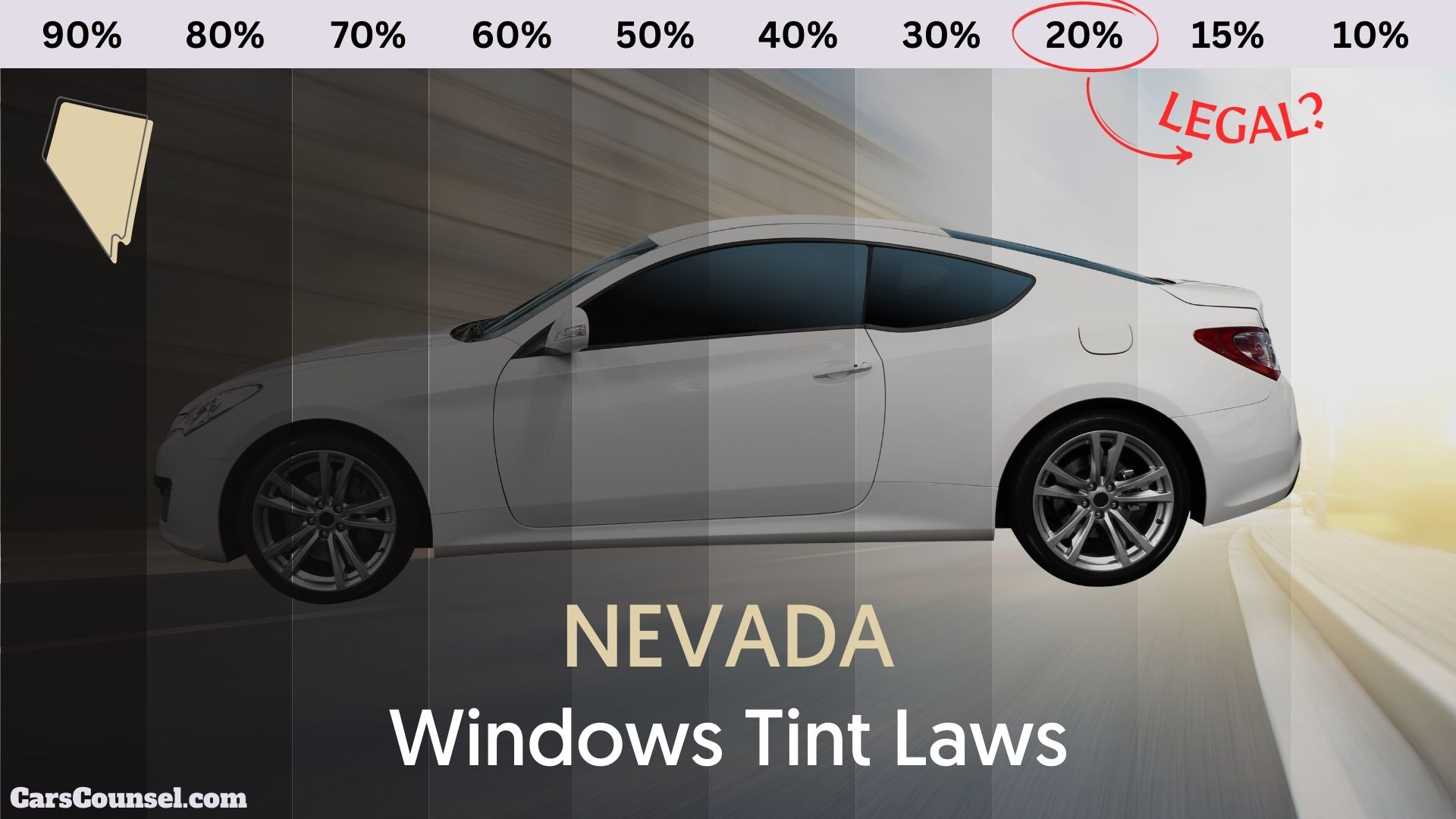As you hit the open roads of Nevada, you might wonder if your vehicle’s window tinting meets the state’s regulations. You’re not alone – the Silver State has strict laws in place to guarantee safe driving conditions. Since 1993, Nevada has enforced specific rules on window film darkness and reflectivity to prevent glare and accidents.
But what exactly are these rules, and how can you certify compliance? From windshield restrictions to medical exemptions, there’s more to Nevada’s window tinting laws than meets the eye.

Quick Navigation
Nevada Window Tint Law Overview
So, what do you need to know about Nevada’s window tint law?
Enacted in 1993, the window tint law has undergone updates to accommodate modern window film products.
You can have non-reflective tint on your windshield above the manufacturer’s AS-1 line, but other windows must allow at least 35% visible light transmission.
Nevada window tint laws apply to all vehicles, including sedans, SUVs, trucks, and vans, with no differentiation based on vehicle type.
If you need a darker tint for medical reasons, you can get an exemption.
Manufacturers must certify their films sold in Nevada to guarantee compliance.
Additionally, you’ll need dual side mirrors if you tint your rear window.
[carscounsel_tint_calculator show_state=”true” default_state=”NV”]
Window Tint Darkness Limits
Most Nevada drivers opt for a tint with a visible light transmission (VLT) of at least 35% for their side and rear windows.
This is because Nevada tinting laws allow for a minimum of 35% VLT on these windows, guaranteeing you can still see outside while maintaining privacy.
For your front side windows, you’re allowed a VLT of at least 35%, while the total Light Transmittance (TLT) must be at least 30%.
Nevada set limits on window tint darkness to safeguard safe driving.
The window tint law permits a certain level of darkness, but you can’t go too far.
If you’re unsure, consult the Nevada DMV for guidelines on allowed light transmission and maximum darkness.
Window Tint Reflection Rules
When it comes to Nevada’s window tint reflection rules, you’ll want to certify your vehicle’s windows don’t produce excessive glare.
In Las Vegas, reflective tint isn’t allowed on windshields or front side windows, as it can cause glare that impairs the vision of other drivers.
- No reflective tint: Nevada prohibits the use of reflective tint on windshields and front side windows.
- Mirrors and dual side mirrors: Verify your mirrors and dual side mirrors aren’t tinted, as they must allow for clear visibility.
- Light transmission: Your window tint should allow sufficient light transmission to prevent glare that could reflect incoming light and cause accidents.
Other Nevada Window Tint Rules
Two other key aspects of Nevada’s window tint laws are the darkness and color restrictions.
You should know that side windows must allow more than 35% of light to pass through, while rear side windows and the rear window can have any darkness level. Additionally, Nevada allows medical exemptions for certain window reflection restrictions.
In regards to windshield tinting, it’s legal as long as it’s non-reflective and doesn’t obstruct your view. Las Vegas actually falls under these state regulations.
In this respect, you’re required to have dual side mirrors if your rear window is tinted. Remember to familiarize yourself with these tint laws in Nevada to avoid any issues with the authorities.
Medical Exemptions and Exceptions
In accordance with Nevada’s window tint laws, you may be eligible for medical exemptions if you have a medical condition that necessitates a higher level of tinting on your vehicle’s windows.
Exceptions: Nevada allows medical exemptions for certain conditions, such as photosensitivity or skin conditions, that require a higher level of window tinting.
To qualify for a medical exemption, you’ll need to obtain certifications from your doctor or medical professional stating that a higher level of tinting is necessary for your health.
You’ll then need to submit this documentation to your local DMV or law enforcement agency.
- Variance: State laws allow for a variance in the percentage of visible light transmission for medical exemptions.
- Nevada State laws regarding window tinting still apply, even with a medical exemption.
- Manufacturers must guarantee that their window tints meet Nevada window tinting standards, even for medical exemptions.
They must also certify that their products comply with these standards.
Window Tint Certification Requirements
With window tinting laws in place, manufacturers must warrant their products meet Nevada’s standards, and accreditation is a crucial step in this process.
You should know that manufacturers must accredit their window film products to confirm they comply with Nevada State’s regulations.
To accredit, they must submit their film for testing to verify it meets the allowed reflectivity levels.
Once accredited, the film is approved for use in Nevada.
The DMV and law enforcement agencies rely on this accreditation to enforce the law.
As a consumer, you can trust that accredited window film products meet the state’s requirements, safeguarding your safety on the road.
Always look for accredited window tint products to avoid any legal issues.
Out-of-State Window Tinting Services
Are you planning to drive your vehicle into Nevada from another state? If so, it’s essential to guarantee your car’s window tint complies with Nevada’s window tinting laws.
Out-of-state window tinting services, like Las Vegas Window Tinting, cater to vehicles from other states, certifying you’re legal on Nevada roads.
- Familiarity with all 50 states’ laws: These services are well-versed in window tinting regulations across the country, certifying your vehicle meets Nevada’s specific requirements.
- Compliance with Nevada window tinting laws: Out-of-state window tinting services guarantee your car’s window tint is legal in Nevada, avoiding any potential issues with law enforcement.
- Catering to different vehicle types: Whether you have a car, truck, SUV, or van, these services can provide compliant window tinting for your vehicle.
Tint Law References
Nevada Revised Statutes section 484.6195: Restrictions on tinting
Medical Exemption Info
Nevada Department of Public Safety – Application for Window Tint Exemption (.pdf file)
Car Window Tinting Laws By State
Click on the state you’re interested in for a complete guide to its tint laws and regulations. If you spot any errors, let us know through our contact page.
| State | Front Side Windows | Back Side Windows | Rear Windows | Windshield |
|---|---|---|---|---|
| Alabama | 32% | 32% | 32% | 6 inches |
| Alaska | 70% | 40% | 30% | 5 inches |
| Arizona | 33% | ANY | ANY | tinting allowed to the top of the manufacturer’s as-1 line |
| Arkansas | 25% | 25% | 10% | 5 inches |
| California | 70% | ANY | ANY | 4 inches |
| Colorado | 27% | 27% | 27% | 4 inches |
| Connecticut | 35% | 35% | ANY | non-reflective tint above the as-1 line top 6 inches |
| Delaware | 70% | ANY | ANY | non-reflective tint above the as-1 line top 6 inches |
| Florida | 28% | 15% | 15% | non-reflective tint above the as-1 line |
| Georgia | 32% | 32% | 32% | 6 inches |
| Hawaii | 35% | 35% | 35% | Non-reflective tint is allowed on the top 4 inches of the windshield |
| Idaho | 35% | 20% | 20% | non-reflective tint above the as-1 line |
| Illinois | 35% | 35% | 35% | 6 inches |
| Indiana | 30% | 30% | 30% | non-reflective tint above the as-1 line |
| Iowa | 70% | ANY | ANY | non-reflective tint above the as-1 line |
| Kansas | 35% | 35% | 35% | non-reflective tint above the as-1 line |
| Kentucky | 35% | 18% | 18% | non-reflective tint above the as-1 line |
| Louisiana | 40% | 25% | 12% | non-reflective tint above the as-1 line top 6 inches |
| Maine | 35% | 35% | 35% | top 4 inches |
| Maryland | 35% | 35% | 35% | top 5 inches |
| Massachusetts | 35% | 35% | 35% | top 6 inches |
| Michigan | 35% | ANY | ANY | top4 inches |
| Minnesota | 50% | 50% | 50% | Top 6 inches |
| Mississippi | 28% | 28% | 28% | non-reflective tint above the as-1 line top 5 inches |
| Missouri | 35% | ANY | ANY | non-reflective tint above the as-1 line top 6 inches |
| Montana | 24% | 14% | 14% | non-reflective tint above the as-1 line top 6 inches |
| Nebraska | 24% | 20% | 20% | top 6 inches or as-1 line, whichever comes first |
| Nevada | 35% | ANY | ANY | non-reflective tint above the as-1 line top 6 inches |
| New Hampshire | 35% | 35% | 35% | Allowed for the manufacturer’s AS-1 line |
| New Jersey | Illegal | ANY | ANY | Top 6 inches |
| New Mexico | 20% | 20% | 20% | 5 inches or as-1 line, whichever comes first |
| New York | 70% | 70% | 70% | top 6 inches |
| North Carolina | 35% | 35% | 35% | non-reflective tint above the as-1 line top 6 inches |
| North Dakota | 50% | ANY | ANY | Top 6 inches |
| Ohio | 50% | ANY | ANY | Top 5 inches |
| Oklahoma | 25% | ANY | ANY | 5 inches or as-1 line, whichever comes first |
| Oregon | 35% | 35% | 35% | Top 6 inches |
| Pennsylvania | 70% | 70% | 70% | Top 3 inches |
| Rhode Island | 70% | 35% | 35% | non-reflective tint above the as-1 line top 6 inches |
| South Carolina | 27% | 27% | 27% | non-reflective tint above the as-1 line top 6 inches |
| South Dakota | 35% | 20% | 20% | non-reflective tint above the as-1 line top 6 inches |
| Tennessee | 35% | 35% | 35% | non-reflective tint above the as-1 line top 6 inches |
| Texas | 25% | 25% | 25% | 5 inches or as-1 line, whichever comes first |
| Utah | 43% | ANY | ANY | non-reflective tint above the as-1 line top 4 inches |
| Vermont | 70% | ANY | ANY | ILLEGAL |
| Virginia | 50% | 35% | 35% | non-reflective tint above the as-1 line top 6 inches |
| Washington | 24% | 24% | 24% | Top 6 inches |
| West Virginia | 35% | 35% | 35% | Top 5 inches |
| Wisconsin | 50% | 35% | 35% | non-reflective tint above the as-1 line top 6 inches |
| Wyoming | 28% | 28% | 28% | Top 5 inches or as-1 line, whichever comes first |

